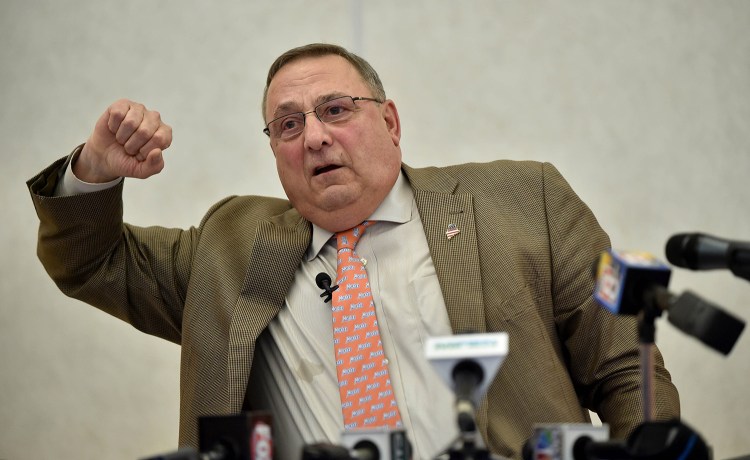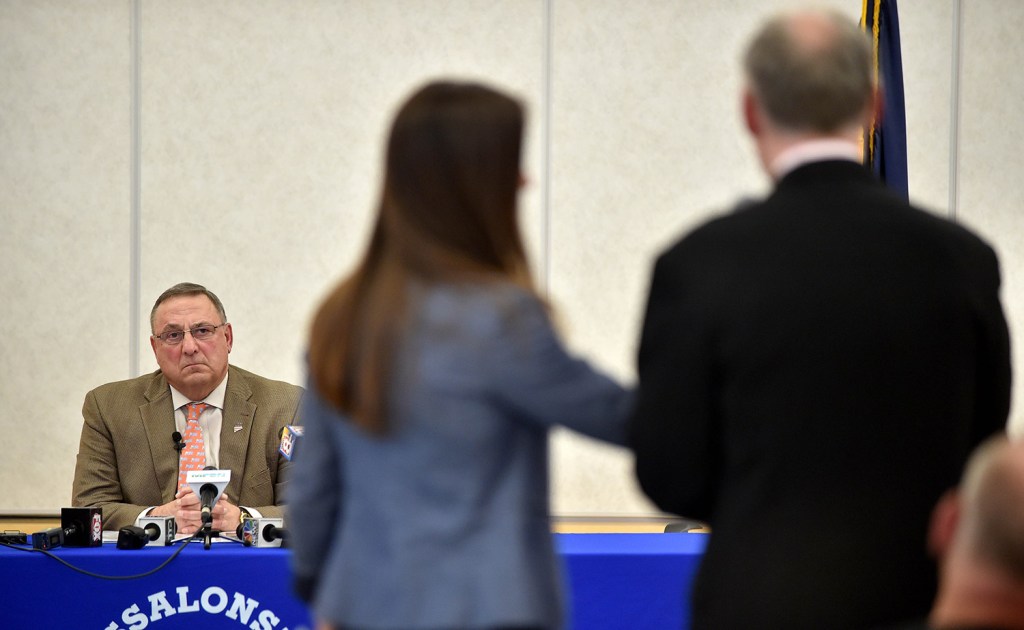OAKLAND — Gov. Paul LePage once again urged Mainers to support his efforts to reduce income taxes and energy costs Tuesday evening while criticizing two ballot initiatives to increase the minimum wage and funding for public education.
LePage largely stuck to his standard talking points during a low-key public forum at Oakland’s Messalonskee Middle School. Unlike most of his recent forums, there were no protests or disruptions at the Oakland event.
On the issue of energy, LePage repeated his contention that a solar energy bill that he successfully vetoed was “a bad deal for Maine” because he said it would have increased electricity rates for Mainers in the long run.
Supporters of the solar policy proposal had disagreed vehemently with the administration’s assessment, saying the measure’s failure creates uncertainty around an industry that was poised for massive growth and job creation.
LePage suggested that his administration is still hoping to negotiate a power-purchasing agreement with Hydro-Quebec, but that New Hampshire has first dibs on it.
“As soon as that decision is made, Maine and Vermont are ready to pounce,” LePage said. “Maine is willing to put in 40 miles (of infrastructure) and go down through the CMP system and Vermont wants to go under Lake Champlain to upstate New York. So there are opportunities and there are things being talked about.”
LePage said a $12-an-hour minimum wage proposal that will appear on the November ballot will harm younger, unskilled workers as well as the elderly on fixed incomes because their costs-of-living will increase. Instead, LePage said the state should be focused on decreasing the income tax rate and eliminating the estate tax.
“Until we learn that you can’t tax yourself into prosperity, we are going to have difficulty,” LePage said.
The only critical question that LePage fielded came from a state employee who asked the governor when he would give workers more than a 1 percent pay raise.
LePage responded by pointing out that he offered state employees a 3 percent raise on the condition that the state employee unions eliminate the “fair share” fee required of employees who elect not to join the union. The fee, which is in lieu of union dues, is intended to cover the costs of collective bargaining, enforcing the contract and representing workers during grievances.
Instead, the unions opted for a 1 percent raise, he said.
“I can’t make your decisions or I can’t make the union decisions,” LePage said. “But all I know is this: You lost 2 percent, but the union dues went to the unions. End of story.”
The employee, Laurie Brann, who works in the Attorney General’s Office, said afterward that she doesn’t agree with the “fair share” requirement and believes the unions should have let members vote on the choice. But she accused LePage of attempting to use the issue to “break the unions.” She also accused LePage of hypocrisy by granting his commissioners and top-level employees large raises – as high as 17 percent for commissioners – last year at a time when he was limiting state employees to 1 percent.
“I think it is all a slap in the regular employees’ faces” in order to hurt the unions, Brann said.
LePage reiterated his pledge to run against independent Sen. Angus King of Maine in 2018 unless he is already working in Washington, presumably for a Donald Trump administration.
Send questions/comments to the editors.





Success. Please wait for the page to reload. If the page does not reload within 5 seconds, please refresh the page.
Enter your email and password to access comments.
Hi, to comment on stories you must . This profile is in addition to your subscription and website login.
Already have a commenting profile? .
Invalid username/password.
Please check your email to confirm and complete your registration.
Only subscribers are eligible to post comments. Please subscribe or login first for digital access. Here’s why.
Use the form below to reset your password. When you've submitted your account email, we will send an email with a reset code.